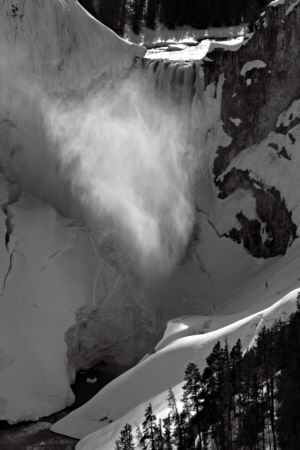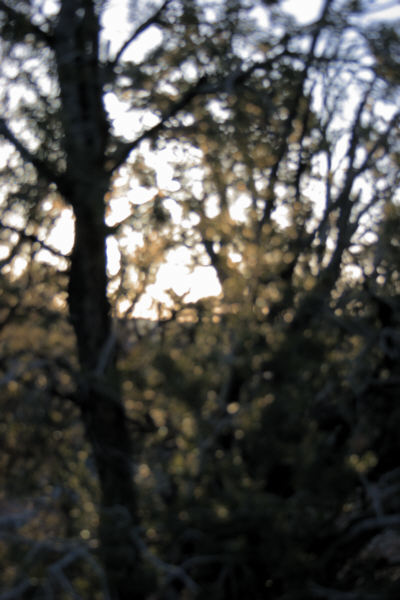Posted by Birgit Zipser on April 25th, 2008
Low tide uncovers mud flats with their extant waterways, the so-called ‘Priele’ at the Nationalpark Wattenmeer, Wilhelmshaven, Germany. ‘Priel’ may be related to ‘Prill’
a word in English brought over from the Watternmeer .. together with other words reminiscent of some landscape of ooze and sandbanks with marshy regions behind (Some Etymologies).
Courtship in mudflats involves:
Mud Swimming
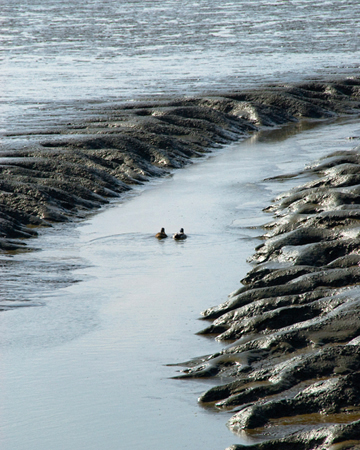
more… »
Posted by Steve Durbin on April 17th, 2008
While reworking and sequencing my Winter Water project, I realized that, for a photographer as well as a physicist, snow, ice, and liquid are very distinct states of water, with distinct texture, tone, and shape. Perhaps because those photographs had no sky, I managed to completely forget about the vaporous state. Last Monday, however, I was vividly reminded of that glorious phase while biking through Yellowstone. Roads were clear but cars not yet allowed, so I had it almost to myself: only a half dozen other bikers all day, and a few service vehicles per hour. Fortunately I had a late start, so by the time I reached the Lower Falls it was well on in the afternoon. The westerly light left the falling water in shade while illuminating the mist.
more… »
Posted by Steve Durbin on April 8th, 2008
About five months ago I described my indecision regarding goals or approaches in my horse project. I can now happily report that I’m still unresolved. It appears that simply making lots of photographs doesn’t necessarily result in refinement. I’ve decided to consider this a good thing, since that’s how it is, anyway. Perhaps one lesson can be drawn: to every style there is a season. Lately in Montana the season has been winter, and a look noted earlier has remained prominent, namely one featuring the texture of snow, especially falling snow, sometimes combined with motion-related texture.
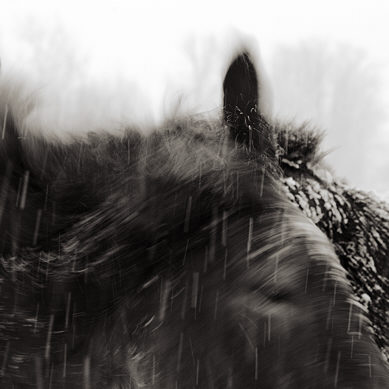
more… »
Posted by Steve Durbin on April 7th, 2008
This is dawn on the Colorado Plateau before I put my glasses on. This particular scene from my bag looks better that way.
Posted by Steve Durbin on April 1st, 2008
Despite the theme of a difficult, overwhelming environment in last week’s post, the Anasazi left many ruins that seem sturdy enough to stand up to it, and perhaps even be a source of power. Sometimes, in the photograph, that impression comes from strong lighting of a well-built structure.
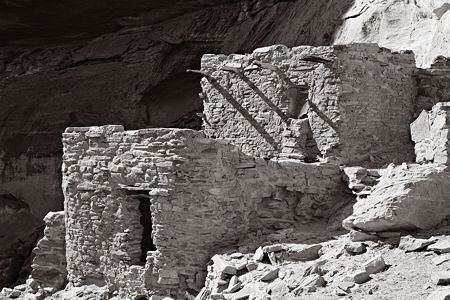
more… »
Posted by Steve Durbin on March 26th, 2008
I’ve just returned from a trip to the Colorado Plateau, my third since getting my camera. The canyon and mesa landscape is amazing, but most of my interest lately has centered around the ancient remains of human habitation, and their relationship to the landscape. I’ve focused on the small settlements and structures, and haven’t even been to larger sites like Mesa Verde in many years. My reasons: the small ruins are not on maps, there are no crowds, and the hiking and searching for them is a large part of the enjoyment.
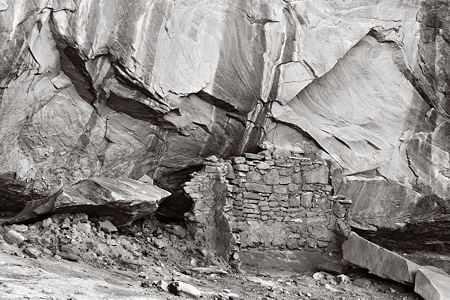
more… »
Posted by Steve Durbin on March 11th, 2008
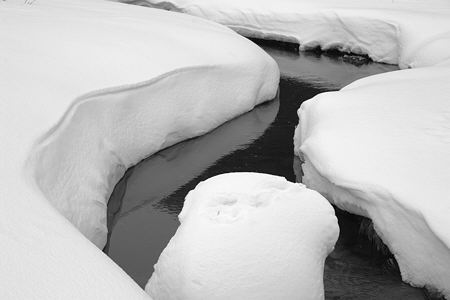
Natural black and white minimalism as well. To a certain extent, photographers choose (or are chosen by) their style when they choose their subject. Of course, the way of framing the subject plays an essential role. But in landscape photographs larger than minute details, it’s hard to find an uncluttered field of view. Winter simplifies.
Since I seem to have a natural inclination toward abstraction, you can well imagine I was delighted to find these snow forms in the wandering branches where the young Gallatin River is still figuring out where it belongs. I was also delighted to be on a pair of broad back country skis, a rental substitute for my 15-year old kit that had finally broken multiple places in every component, to the point it really was not usable even by an anti-gear guy like myself. The new skis allowed me to move easily along and among these streams, despite the deep, soft snow. I would gladly have spent all day there, had I been free.
more… »

